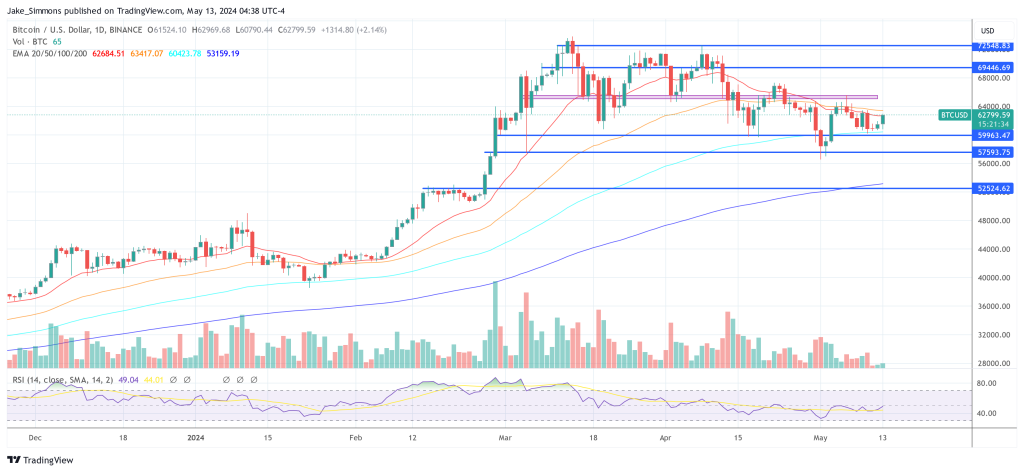As a researcher with a background in finance and economics, I find Keith Ammon’s proposal to explore the potential of diversifying New Hampshire’s financial reserves into Bitcoin ETFs an intriguing idea worth investigating. The explosive growth of Bitcoin over the last decade, as highlighted by Ammon through his what-if scenario, is a testament to the digital asset’s transformative power and potential.
Keith Ammon, New Hampshire State Representative from New Boston, Mont Vernon, and Lyndeborough, as well as Vice Chair of Commerce and Consumer Affairs, initiated a discourse on Twitter about the possibility of expanding New Hampshire’s financial reserves into Bitcoin Exchange-Traded Funds (ETFs). His thought-provoking comments depict an intriguing hypothetical situation that emphasizes Bitcoin’s remarkable growth during the last ten years.
What Bitcoin Can Do For New Hampshire
Ammon raises an intriguing question regarding New Hampshire’s financial strategies at a pivotal moment when traditional investors are increasingly recognizing the value of Bitcoin and other digital assets. In his insightful assessment, he proposes, “Could New Hampshire consider exploring a minimal investment of its reserves into a Bitcoin Exchange-Traded Fund (ETF)? Looking back, it would have been rewarding had New Hampshire allocated only 5% ($4.65M) of its $93M rainy day fund in 2016 to Bitcoin and held it until now. That equivalent value in Bitcoin today would amount to approximately half a billion dollars ($473M), representing an impressive 10,000% return on investment.”
Based on current reports, institutional investment in Bitcoin has witnessed a significant uptick. For instance, BlackRock, the globe’s largest asset manager, has disclosed an influx of Bitcoin Exchange-Traded Fund (ETF) investors. This group now encompasses entities such as sovereign wealth funds and pension funds.
Ammon points out that Manuel Nordeste, Fidelity’s Vice President of Digital Assets, has brought attention to the increasing adoption of Bitcoin ETFs by significant pension funds and financial institutions. Nordeste’s remarks were made in light of heightened curiosity surrounding the digital asset market. He shared that a quarter of pension fund managers attending a recent conference owned digital assets personally. If even 1% of the $5.5 trillion in assets under management by states flowed into Bitcoin, it would exceed mining revenues and create a supply deficit versus demand, potentially triggering a price surge for the cryptocurrency.
Considering the prospective effects, Ammon additionally mentioned a projection made by Cathie Wood, the CEO of Ark Invest. She estimates that the price of a single Bitcoin could soar up to $3.8 million by the year 2030 if institutional investors were to invest over 5% of their portfolios in this cryptocurrency.
Based on this forecast, Ammon calculated the potential gains for New Hampshire if they put 5% of their $290M rainy day fund into a Bitcoin ETF at present prices and kept it until 2030. The estimated value would be around $900M, resulting in an impressive return on investment of approximately 6,200%.
Such investments carry far-reaching consequences beyond just potential profits. The State of New Hampshire is burdened with approximately $1.45 billion in outstanding debts. This includes a hefty $1.25 billion obligation to its pension fund and roughly $200 million in bond repayments.
Ammon proposes that considering unconventional investment options, such as Bitcoin, could potentially help address our financial difficulties. He intriguingly questions, “How might we extricate ourselves from this predicament? The possible answer could be right in front of us; it’s worth delving deeper to find out.”
The Bitcoin community and financial experts swiftly responded. Noted Bitcoin expert James Lavish emphasized the significance of this factor from a fiduciary duty standpoint.
As an analyst, I would respond: It’s a affirmative answer you’re looking for. However, let me provide some additional context. Neglecting to explore the possibility of investing in Bitcoin, given the escalating national debt and substantial deficits, could potentially be considered a violation of fiduciary responsibility.
“Dennis Porter, as CEO and co-founder of Satoshi Act – a US-based non-profit promoting Bitcoin mining – endorsed this viewpoint succinctly by stating, ‘I’ve made my position clear.'”
Ammon’s proposal underscores the increasing political importance of Bitcoin in the United States, indicating a transition towards cryptocurrency emerging as a major electoral topic. This trend is further emphasized by former US President Donald Trump’s recent shift towards a pro-Bitcoin and crypto stance, aiming to capitalize on this position in his efforts to regain the presidency.
Trump’s about-face signifies a significant shift, underscoring the growing importance of cryptocurrencies in political maneuvers and economic debates at the national level.
At press time, BTC traded at $62,799.

Read More
- ENA PREDICTION. ENA cryptocurrency
- USD PHP PREDICTION
- SOL PREDICTION. SOL cryptocurrency
- BTC PREDICTION. BTC cryptocurrency
- SHIB PREDICTION. SHIB cryptocurrency
- USD COP PREDICTION
- LUNC PREDICTION. LUNC cryptocurrency
- Red Dead Redemption: Undead Nightmare – Where To Find Sasquatch
- USD ZAR PREDICTION
- BRISE PREDICTION. BRISE cryptocurrency
2024-05-13 14:12